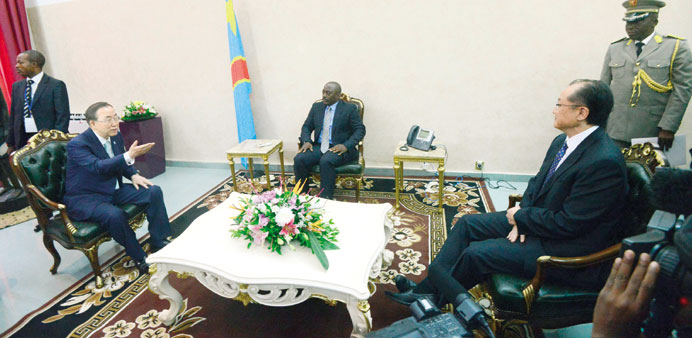Democratic Republic of Congo President Joseph Kabila with UN secretary general Ban Ki-Moon and World Bank President Jim Yong Kim at the Nation Palace in Kinshasa yesterday.
AFP/Congo
Fighting erupted between the Congolese army and rebels near the flashpoint eastern city of Goma for a third straight day yesterday, further shattering months of uneasy calm as UN chief Ban Ki-moon began a visit to the country.
Residents of nearby refugee camps have been fleeing in their hundreds since Monday when the government says 19 people were killed in battles between M23 rebels and troops near Goma, the first fighting in the deeply troubled region since last year’s crisis.
Ban arrived in Kinshasa as part of a Great Lakes tour which should also take him to Goma, the hub of the mineral-rich east of the Democratic Republic of Congo that has long been the flashpoint for regional conflict.
He said Tuesday during a visit to Mozambique that the deployment of a rapid UN intervention force made up of about 3,000 African troops should be accelerated in view of the fresh unrest, unleashed just three months after a UN-brokered accord signed by regional African leaders.
“Considering what has happened I think we must expedite the deployment so they will be fully responsible as soon as possible,” said Ban.
The force was approved by the UN Security Council in March as its first ever “offensive” peacekeeping brigade.
Ban is due today to visit Goma, where the largest UN peacekeeping force in the world is deployed but which failed to stop last year’s uprising by the M23 rebels and their brief occupation of the city.
A UN source said there was no question of Ban cancelling his trip to Goma despite the deadly unrest, which comes barely a week after the first troops from the new UN intervention brigade arrived in the east, an area gripped by conflict for more than two decades.
M23 - a largely ethnic Tutsi group—vowed to retaliate if attacked by UN troops after the Security Council approved the creation of the attack force, which includes soldiers from Tanzania, Malawi and South Africa and is charged with conducting “targeted offensive operations” against rebels.
Both sides blame each other for launching the latest round of hostilities, which flared as peace talks which first opened in December in Kampala remain stalled.
Ban’s tour will also take him to Rwanda and Uganda which have been accused by both Kinshasa and the UN of backing M23, an allegation the two neighbouring countries deny.
M23 rebels, who had briefly seized Goma in November despite the presence of the UN peacekeepers, said they had come under attack from government forces yesterday.
“The FARDC (Congolese army) has been attacking us since 6am (0400 GMT) with mortars, tanks and rocket launchers in the Mutaho area,” M23 military spokesman Vianney Kazarama said.
Kazarama said the M23 had no intention of trying to take over Goma again, although the UN mission has boosted security in the city.
The UN says about 800 people have fled refugee camps located near the epicentre of the fighting this week in Mutaho, about 12km north of Goma.
Colonel Olivier Hamuli, spokesman for the army in North Kivu province, denied government forces had started the fighting.
“It is they who began (to attack) as they want to take Mutaho at any price... We are fighting back to defend our positions and so far we have suffered no losses,” Hamuli said.
He also accused the rebels of “deliberately launching bombs on the population” and of using long-range weapons that had reached areas such as Mugunga to the west of Goma where refugee camps are located.
Government spokesman Lambert Mende had told journalists that Monday’s clashes had left 15 rebels and four soldiers dead, while the rebels put the number of dead at two soldiers.
Ban is accompanied on his trip by World Bank president Jim Yong Kim, UN peacekeeping force chief Herve Ladsous and Mary Robinson, the UN special envoy for the Great Lakes region.
World Bank president Jim Yong Kim pledged $1bn in aid for Africa’s Great Lakes region while UN Secretary General Ban Ki-moon said “the time for peace” had come in the vast conflict-wracked country.
“Now is the time for peace and development for the people of DRC and of the region,” Ban said in Kinshasa after a meeting with President Joseph Kabila.
“That is why we are here that is what we will continue to do one hundred%,” he said, following the World Bank’s announcement of new funding to promote health, education, trade and infrastructure in the region.
“We made extraordinary efforts to secure an additional $1bn in funding because we believe this can be a major contributor to a lasting peace in the Great Lakes region,” Kim said in Kinshasa.
The UN’s refugee agency said the new spate of fighting less than 10 miles of Goma had led around 30,000 displaced civilians to flee their temporary shelters.
“The Mugunga I camp for the displaced, which housed 55,000 people, emptied by 45% while Mugunga III, which had 13,000 registered residents emptied by 70%,” spokesperson Simplice Kpandji said.

